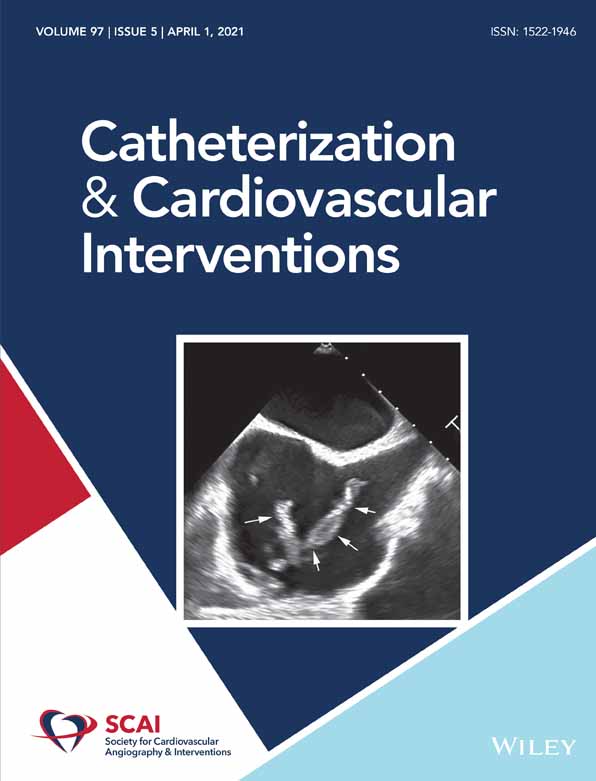Antithrombotic regimens for percutaneous coronary intervention of the left main coronary artery: The EXCEL trial
Abstract
Objectives
We compared the effect of bivalirudin or heparin and use or nonuse of glycoprotein IIb/IIIa inhibitors (GPI) on the outcome of left main coronary artery (LMCA) percutaneous coronary intervention (PCI) in the randomized EXCEL trial.
Background
The optimal antithrombotic regimen to support PCI of the LMCA remains controversial because of low representation of this subset in clinical trials.
Methods
The PCI cohort (n = 928) in EXCEL was divided according to bivalirudin versus heparin antithrombin treatment and compared for the primary composite endpoint of death, myocardial infarction (MI), or stroke at 30 days and 5 years.
RESULTS
Bivalirudin was used in 319 patients (34.4%). The composite endpoint at 30 days occurred in 7.2% versus 3.8% bivalirudin and heparin patients, respectively, p = .02; at 5 years, the composite endpoint occurred in 26.3% versus 19.9% bivalirudin and heparin patients, respectively, p = .02. Major bleeding was more frequent in bivalirudin patients (4.1% versus 1.3%, p = .008). There were no differences in stent thrombosis between the groups. Bivalirudin use was an independent predictor of the 30-day composite endpoint (OR 2.88, 95% CI 1.28–6.48, p = .01) but not of the 5-year composite endpoint (OR 1.30, 95% CI 0.84–2.02, p = .23). GPI use was infrequent (n = 67, 7.2%) and was not associated with adverse outcomes.
Conclusion
Among patients undergoing LMCA PCI in the EXCEL trial, procedural use of bivalirudin was associated with greater rates of periprocedural MI and the 30-day composite endpoint without reducing bleeding complications. Five-year outcomes were similar. GPIs were used infrequently and were not associated with clinical outcomes.
CONFLICT OF INTERESTS
The EXCEL trial was funded by Abbott Vascular (Santa Clara, CA). S. J. B.: Speakers bureau – AstraZeneca. N. J. L.: Advisory board – Abbott Vascular; speakers bureau - Abbott Vascular, Boston Scientific, Medtronic, Abiomed. D. E. K.: Consulting honoraria – Medtronic, Biotronik, Cardiovascular Systems, Inc.; Institutional research/grant support – Medtronic, Biotronik, Boston Scientific, Orbus Neich, Teleflex. M. S.: Consultant – Abbott Vascular. A. P. B.: Institutional sponsorship for a fellowship from Boston Scientific and lecture fees from Boston Medtronic and Abbott Vascular. Partially funded by the NHS Oxford NIHR Biomedical Research Centre. P. E. B.: CEO and Cofounder – American Heart of Poland S.A. C. A. S.: Employee – Abbott. J. F. S. III: Consultant – Medtronic. Advisory board – Medtronic Cardiac Surgery. A. P. K.: Employee – Medtronic. P. W. S.: Consultant – Abbott, Biosensors, Medtronic, Micell Technologies, SINOMED, Philips/Volcano, Xeltis, HeartFlow. Other authors: No relevant conflicts to disclose.




